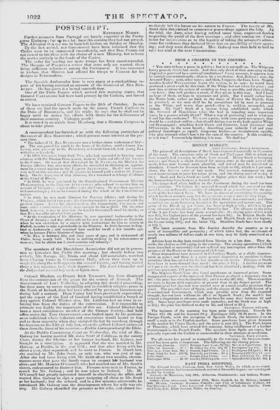The members of the Marylebone Association did not go in
proces- sion to Lincoln's Inn Fields this morning ; but shortly before two o'clock, Air. Savage, Mr. Brain, and about 150 associators, marched from Charing Cross to lOresiminster hull ; where they drew up in single file elong. the wall oppesite the several Courts ; turd having waited there a few minutes, tom.: t!wir departure. The Lord Choueellor and the Judges had a niced rwij cmii hr. or bybre them.
Colonel Blacker, ex-Deputy Irieh Treasurer, has been dismissed from the commission of the peace for the county of Armagh. The Government of Lord Wellesley, in adopting this decided proceeding, has done more to secure traequillity and to establish religious peace in the North of Ireland, than has been effected by previous Governments during half a century. Dean Carter had been previously superseded ; aud the report of the Earl of Gosford haying established a breach of duty against Colonel Blacker also, Mr. Littleton lost no time in re- lieving him from the ditties of the commission. It is impossible to estimate too highly the importance of this act. Colonel Blacker had been a most conspicuous member of the Orange Society—bad held office under the Tory Government—Wile looked upon by his partisans as an individual whose influence and connexions would insure to hirn and to them impimity when they violated the law by marching through his demesne on the lath of July last, when the gallant Colonel iiddressed them from the front of his mansion.—Dablia Correspondent of the Globe.
At the Dublin Commission Court on Wednesday, the trial of Mrs. Galway for having married Mr. John Scott of Cahircue, in the county Glare, during the lifetime of her former husband, Mr. Galway, was
brought to a contiusioo. It appeared that she was married to Mr. Galway, at Dublin, in the year 1821 ; and that after living with her about a year, they separated, anal he went to France. in March last, she married to Mr. John Scott, an only son, who was just of' age. After she had been living with Mr. Scott about two months, circum- stances arose that gave the family cause to suspect- her husband was alive; and Mr. Maurice O'Connell, who had married one of Mr. Scott's sisters, endeavoured to discover him. Persons were sent to France, to search for Mr. Galway ; and he was taken to Ireland. Mr. M. O'Connell had greatly interested himself in elucidating the affair, and wanted Mrs. Galway to sign a paper resigning all claim to Mr. Scott as her husband ; but she refused, and in a few minutes afterwards, be introduced Mr. Galway into the drawingroom where his wife was sit- ting. Mr. Galway identified the prisoner as,his wife, and almost in:- mediately left the house on his i eturo to France. The ramify of Mr. Scott then determined to commence proceedings against the lady. At • the trial, the Jury, after having retired some flare, expressed doubts respecting the proof of the first Man iage ; and after coming int Court twice for information as to the legality of taking the prisont.r's admis- sions for evidence, they declared there was no possibility of their agree- ing ; and they were discharged. Mrs. Galway was then held to bail to take her trial at the next Commission. •




















 Previous page
Previous page